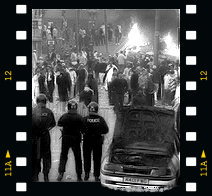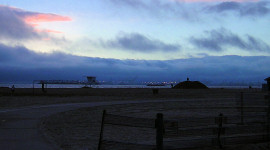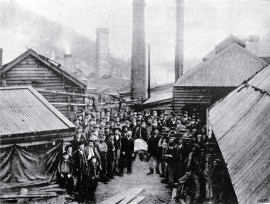
[There’s Always Trouble v.2]
I had lived in my midurban neighborhood for two years when I wrote this song and I would live there for 13 more. Not quite two years after I wrote this, the ’92 riots would claim buildings within 100 yards of my house — I could see flames between the buildings as I hung on my back fence, a fire axe in one hand.
I fell in love with my house — and I lived there longer than I’ve ever lived anywhere, 15 years. But my relationship with the neighborhood was more complex. I made a lot of friends of all races and cultures and all economic strata from canners in the alley (a very tough alley, I’m afraid) to a middle aged gay couple in a (truly) fabulous two story Spanish style house with a beautiful tiled atrium fountain and a white grand piano (not a baby but a full grand) that actually looked good in the room. (OK, I understand your skepticism. It sounds pretty Liberace but it was really very cool looking. Honest. Oh, skip it.)
More typical was the Philipino World War II veteran. He’d been a guerilla, fighting with a machete — and later a gun — against the Japanese occupation, joining up with US marines to help route the Japanese. In return, after the war, he was made personal chef for an admiral and allowed to apply for citizenship. He bought a house in my neighborhood in the late ’40s or early ’50s and they had lived there since.
After their home was invaded by thugs with guns and he — at the age of 82 — got a nasty pistol whipping when he tried to stand up to them, his wife made him agree to move, but the property values were then in a long slump (aggravated by the riots a few year prior). And they liked people in the neighborhood. (The thugs were not from our neighborhood, of course.)
In the city, stuff happens.
I hadn’t been in my charming little Spanish style duplex bungalow more than six or eight weeks when a guy tried to crash through my kitchen window. While I was home. Entertaining friends. Less than ten feet away.
I ran out to the kitchen, thinking I’d tip the fellow off that he’d picked an inopportune time to do a little B&E on the new guy’s house, perhaps saving us all the embarrassment of a surprise front-to-front confrontation.
Dropping my jaw as far as I could to deepen my voice I said, “Hey! I’m calling the police, right now.”
Window glass and splintered wood was flying every direction and it was impossible for me to see more than two big bleeding arms in a flurry of flying mini-blinds.
It didn’t stop. “I’m calling the f—— cops, right now!”
My heart skipped a whole beat, I know, when this gravelly voice finally replied:
“Yeah, call the f—— cops.”
I pushed my friends (among them a former army tank commander and a woman (his wife) who would later become a police officer, herself) into the back of the house. Behind me the breaking glass stopped and I did not want to wait to find out if that meant he was now inside or if he had given up. I would later find that was because there was virtually no glass left in the window frame. But the guy was so big, he couldn’t get through the window, anyway, although it appeared he tried. But I didn’t find that out until later.
I called the police and with my friends locked in a back bedroom, I let myself out a bedroom window and stealthily came around the back of the house to the front corner where my pretty little breakfast nook more or less was. It appeared the guy was gone. I let myself in.
The police came 25 minutes later and couldn’t be bothered to file a police report. When I protested that I would probably need a police report to file with my insurance claim, they said, over their shoulder, “It’s under your deductible, forget about it.” (Fortunately the donut eaters who clogged the force in those days were all put out to pasture or fired after their stunning nonperformance during my town’s unwilling participation in the so-called LA riots. We have a younger, more multi-ethnic and considerably more modern force, now. They actually do some policing and manage to treat citizens with respect, usually. It shows it can be done.)
Anyhow, all that aside, though this song is, to some extent, about the city, it’s worth pointing out that trouble can come knocking anywhere, anytime. I’ve seen a lot of trouble int he city. It’s plenty real. But I also have seen trouble in the country — and sometimes, it can be even scarier.
Or just plain weird.
I knew a family with a house on a small, very unglamorous lake. Their property extended a fair distance to the water’s edge. On two separate occasions (as I recall it… next time, it might be three separate occasions) they had skydivers “go in” on their property, due to malfunctioning parachutes. One can imagine the skydivers’ thinking in those last few seconds, perhaps guiding themselves toward the murky waters of the lake and then wondering in the last moments if that was really such a good idea after all. Now that’s what I call trouble.
You can find the first AYoS version of Trouble here.
THERE’S ALWAYS TROUBLE
9/7/90
There’s always trouble in a fool’s paradise
There’s always trouble but the fool don’t realize
Trouble comes knocking just when trouble wants
trouble knock down your front door and take everything you got
There’s always trouble but the fool don’t realize
there’s always trouble in a fool’s paradise
There’s always suffering, plenty to go around
but give it to some other guy, on some other side of town
I don’t know my neighbors, buy they seem nice enuff
and if some guys come and blow them away makes it hard to maintain my bluff
There’s always trouble but the fool don’t realize
there’s always trouble in a fool’s paradise
Trouble stay out of my backyard
I pretend it don’t exist
sure enough I feel real bad
for that poor fool the trouble hits
but it really aint none of my affair I fold the paper away
cause I sure enough know I don’t wanta read bout
the trouble (clearly) headed thisa way (comin any day)
There’s always trouble but the fool don’t realize
there’s always trouble in a fool’s paradise
Theres always turmoil in the heart of Babylon
but you go where the gold is and the rest just tag along
theres always losers in the race to stay alive
theres always casualties but sometimes the strong survive
There’s always trouble but the fool don’t realize
there’s always trouble in a fool’s paradise
(C) 1990, TK Major




